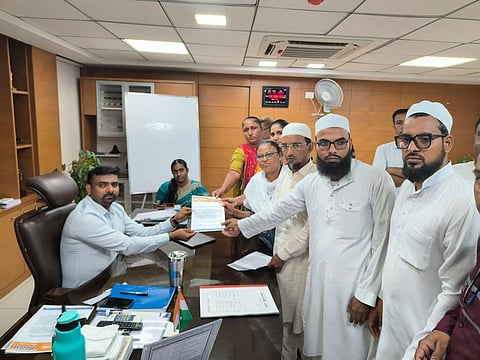
Gandhinagar- In a move that has sparked significant controversy, the Gujarat government has recently introduced the "Values and Principles of Bhagavad Gita" into the textbooks of classes 6, 7, and 8 across schools.
This curriculum change has been met with substantial opposition from various religious communities and organizations, most notably the Swayam Sainik Dal (SSD), which has voiced strong concerns over the potential threat to India's secular fabric.
The SSD has issued an urgent letter to the authorities, demanding the immediate withdrawal of the newly introduced syllabus in the textbooks of classes 6, 7, and 8 in Gujarat schools.
The SSD emphasizes the need for equal representation of all religions in the educational curriculum to uphold the secular fabric of the nation.
Memorandums are being submitted across the state to all district magistrates and education offices, urging officials to withdraw the textbooks with immediate effect.
Speaking with The Mooknayak, Sanjay Baudhh, a volunteer said that the SSD's demand is grounded in the fundamental rights enshrined in the Constitution of India, particularly the provisions related to religious freedom and non-discrimination.
Article 25 guarantees the freedom to profess, practice, and propagate religion, while Article 26 ensures the right to manage religious affairs. Article 28 explicitly prohibits religious instruction in state-funded educational institutions, reinforcing the secular nature of Indian education.
The SSD argues that introducing a syllabus centered solely on the Bhagavad Gita, a Hindu religious text, in a secular educational system where students from diverse religious backgrounds study together, violates the principles of equality and non-discrimination.
The organization fears that such a move may sow seeds of religious intolerance and fanaticism, potentially leading to conflicts between different religious communities in the future.
In March 2022, the Gujarat government announced in the state Assembly that the Bhagavad Gita would become part of the school syllabus for classes 6 to 12.
In December 2023, the Gujarat Government announced the inclusion of spiritual principles and values from the 'Shrimad Bhagavad Gita' as a supplementary textbook for classes 6 to 8.
Education Minister Praful Pansheriya said the initiative aims to enhance students' moral education and cultural awareness.
He emphasized that incorporating the Bhagavad Gita into the curriculum would help students develop a sense of pride and a deeper connection to India's rich, diverse, and ancient cultural and knowledge traditions.
The minister highlighted that the new supplementary textbook, based on the revered scripture, is designed to instil moral values among students. The first part, intended for classes 6 to 8, has been distributed to schools nationwide. Additionally, two more parts for classes 9 to 12 are in development.
The decision is reported to be alignment with the National Education Policy (NEP) 2020, which emphasizes introducing both modern and ancient cultures, traditions, and knowledge systems to foster a sense of pride among students.
The SSD strongly advocates for an inclusive approach to religious education, proposing that values and principles from all major religions be incorporated into the curriculum. This includes teachings from:
The Bible (Christianity)
Guru Granth Sahib (Sikhism)
Tripitaka (Buddhism)
Zend Avesta (Zoroastrianism)
Quran (Islam)
Jain Agamas (Jainism)
By integrating the values and principles from these diverse religious texts, the SSD believes that students will gain a broader, more inclusive understanding of moral and ethical values, fostering a spirit of unity and mutual respect among different religious communities.
In their letter addressed to the Governor of Gujarat, the President of India, the Chief Minister of Gujarat, and the Minister of Education, the SSD has called for the immediate removal of the Bhagavad Gita syllabus.
They warn that failure to do so may result in widespread protests and agitation by minority religious communities, holding the government administration accountable for any ensuing unrest.
The SSD's letter reflects a broader concern for maintaining secularism and ensuring that the educational system respects and represents the diverse religious landscape of India. The organization urges the government to reconsider its decision and work towards an inclusive and balanced approach to religious education in schools.
You can also join our WhatsApp group to get premium and selected news of The Mooknayak on WhatsApp. Click here to join the WhatsApp group.